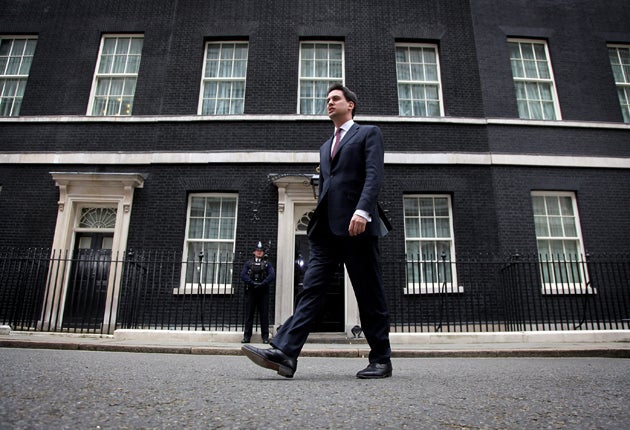Ed Miliband launches his leadership bid by urging return to 'old radical edge'

Your support helps us to tell the story
As your White House correspondent, I ask the tough questions and seek the answers that matter.
Your support enables me to be in the room, pressing for transparency and accountability. Without your contributions, we wouldn't have the resources to challenge those in power.
Your donation makes it possible for us to keep doing this important work, keeping you informed every step of the way to the November election

Andrew Feinberg
White House Correspondent
Ed Miliband will open his campaign to win the Labour leadership today with a warning that the party needs to move on from the New Labour era and rediscover its "radical edge".
The former energy and climate change secretary is expected to announce his intention to succeed Gordon Brown in a move that will pit him against his older brother David, the former foreign secretary.
In a speech to a Fabian Society conference in London, Ed Miliband will say that after 13 years in office, Labour lost touch with its natural constituency, including millions of people on modest incomes, and lost the progressive ideals of its early years in power after its 1997 election victory.
Although the two brothers will avoid personal attacks during the leadership election, a divide is emerging. Ed Miliband, who is to the left of David, will reject his brother's suggestion that a change of policy on issues such as crime, immigration and housing will be enough to recapture the centre ground and campaign for a radical shift to a new "fairness" agenda.
In today's speech, Ed Miliband will argue: "We lost that radical edge. When it came to the bankers, we let being in government constrain our willingness to be as radical again. Let's be honest, Gordon's response to the financial crisis was incredibly bold and helped keep the economy afloat.
"But our response on the excesses of the banks – and the role of the nationalised banks – has not been all it could be. We should have done more to take the opportunity to rethink the banking system and to show our determination to tackle what had gone wrong."
He will pay tribute to Mr Brown and refuse to blame him for Labour's election defeat. Referring to the former prime minister's criticism of a 66-year-old "bigoted woman", he will say: "Let's not try and explain away our defeat on the basis of one person or one moment in a campaign."
Ed Miliband will tell the conference: "We must start by understanding the country we seek to lead again and the reasons why we lost. I will always defend the fact that we made this country more prosperous, fairer, more democratic ... But there is deep thinking we need to do about what went wrong.
"For me there are two central lessons: we lost touch with the lives of the people we represent; we lost touch with the progressive ideals that characterised the earlier years of the government."
Setting out his mission statement, he will say he joined Labour with a sense of anger at the injustices of the world "and a sense that my parents instilled that we had a duty to do something about them. Above all, a belief that the Labour Party is the best vehicle, the best hope for progressive change in this country".
Ed Balls, the former schools secretary, is expected to confirm he will be a candidate next week. He would have stood aside for his wife Yvette Cooper, the former work and pensions secretary, but she did not want to run this time.
Other possible contenders include Andy Burnham, the former health secretary, and Jon Cruddas, a backbench MP who has strong grassroots support. Yesterday Mr Cruddas attacked New Labour for its "broken covenant" with working-class communities on immigration, work and housing.
He told Prospect magazine that too many migrants were allowed to enter Britain to hold down wage levels. "Immigration has been used as a 21st-century incomes policy," he said. "And protections in terms of the labour market have not been substantial enough."
On New Labour, he argued: "What we've lost is a warmth, a compassion in our language: it's partly managerialism but it's also the consequence of a conscious political strategy and our encampment in a specific part of the electorate."
Mr Cruddas called for the "levers in Whitehall" to be exchanged for local initiatives, what he called a political "glue" to bind communities together. He said that on housing, Labour "bet the ranch on the private oligopoly of house builders but it's in their interests to bank land and ration housing so that house prices continue to rocket".
Subscribe to Independent Premium to bookmark this article
Want to bookmark your favourite articles and stories to read or reference later? Start your Independent Premium subscription today.
Join our commenting forum
Join thought-provoking conversations, follow other Independent readers and see their replies
Comments